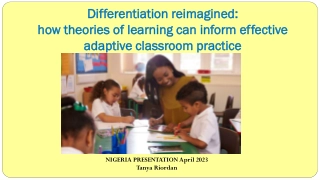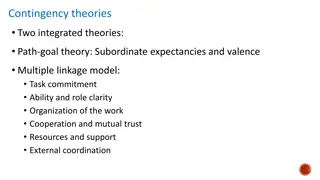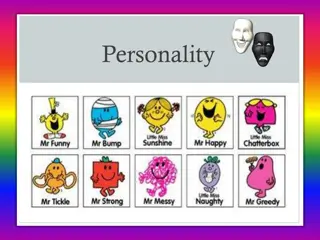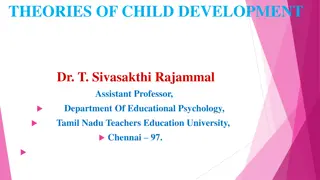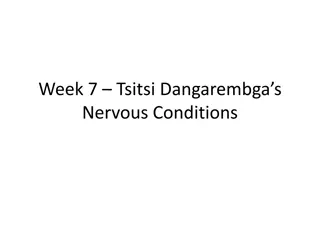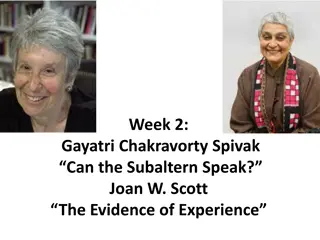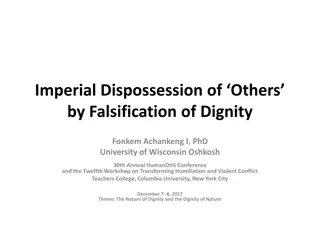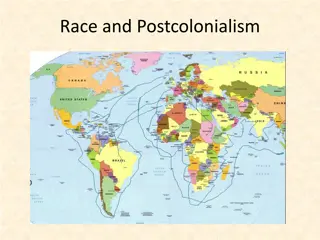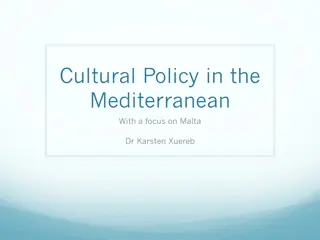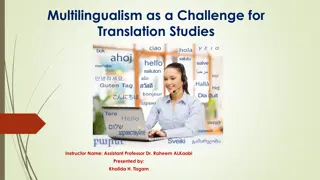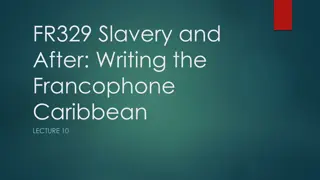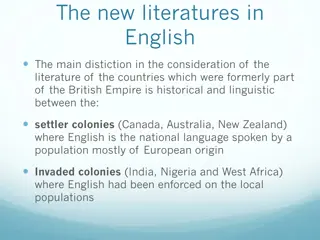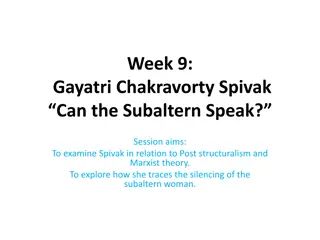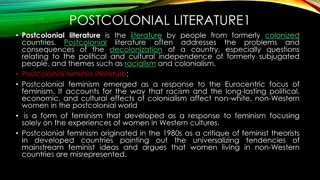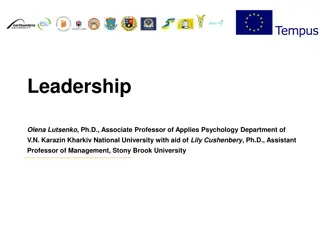Reimagining Differentiation: Enhancing Classroom Practice Through Learning Theories
Explore how theories of learning can inform effective adaptive classroom practice, focusing on the concept of differentiation. The presentation delves into reimagining differentiation, key theories supporting it, and practical strategies to support differentiation in language classrooms. The researc
0 views • 35 slides
Leadership Theories and Power Dynamics in Organizations
Explore contingency theories, dyadic theories, power and influence concepts, and leadership lessons from "12 Angry Men". Dive into the significance of leader-member exchange (LMX), political skills, and the interplay between power, politics, and organizational efficiency.
0 views • 27 slides
Theories Explaining Deviant Sexual Behavior Throughout History
Explore historical theories on deviant sexual behavior, including demonological, anomie, psychoanalytical, human ecology, and somatotyping theories. These theories range from supernatural beliefs of possession to scientific interpretations of societal influences and individual characteristics.
2 views • 33 slides
Testing Extended Theories of Gravity Using Black Hole Shadows
Exploring the shadows of black holes as a method to test extended theories of gravity, this study discusses the existence of black holes, gravitational wave astronomy, and direct imaging. Researchers Oleg Zenin, Stanislav Alexeyev, Alexandra Nemtinova, and Artem Baiderin present findings on black ho
5 views • 18 slides
Insights into Theories of Motivation and Their Application
Motivation, a driving force behind human behavior, is explored through various theories like Maslow's hierarchy of needs, McClelland's learned needs theory, and others. Understanding these theories can help organizations enhance worker productivity by addressing different motivational factors.
9 views • 21 slides
Understanding Key Nursing Philosophies and Theories
Explore the development of nursing philosophies and theories with a focus on prominent figures like Henderson, Orem, Roy, Rogers, Leninger, and Pender. Delve into the historical stages of philosophical development in nursing and the three schools of thought in nursing. Engage in group discussions an
10 views • 12 slides
Understanding Business Ethics Theories and Principles
Explore various business ethics theories including Ethical Concepts, Moral Behavior Development, Ethical Principles, and the Role of Ethics in Business. Delve into the concept of ethics, moral behavior evolution, ethical principles like autonomy, honesty, justice, and integrity, and the importance o
10 views • 17 slides
Managerial Theories and Criticisms
Delve into the world of management theories, from classical to modern approaches, exploring the foundational principles of management, the evolution of theories, and criticisms of traditional perspectives. Learn about the basic functions of management and the insightful perspectives of renowned theo
2 views • 11 slides
Understanding Personality: Theories, Types, and Assessment
Exploring the intricate world of personality, this comprehensive guide delves into major theories of personality development, assessment methods, cultural influences, and key contributors. Discover the different types of personalities, including Type A and Type B, and unravel the complexities of psy
1 views • 96 slides
Introduction to Organizational Behavior: Management Theories and Practices
Explore the evolution of organizational behavior from early management theories to contemporary practices. Understand the historical foundations and relevance of management theory in shaping workplace dynamics. Delve into key concepts like Scientific Management, Administrative Management, Bureaucrat
1 views • 28 slides
Understanding Theories of Child Development by Dr. T. Sivasakthi Rajammal
Child development theories such as Erikson's psycho-social theory, Piaget's cognitive development theory, and Kohlberg's moral development theory explain how children grow and change across different stages of childhood. These theories focus on various aspects of development including social, emotio
0 views • 27 slides
Psychological Theories of Criminality: Understanding the Roots
Psychological theories of criminality delve into the association between intelligence, personality, learning, and criminal behavior. Major theories include Psychodynamic Theory by Freud, Behavioral Theory by Bandura, and Cognitive Theory by Kohlberg. These theories explore how unconscious mental pro
1 views • 20 slides
Exploring Leadership Theories: Traits and Behaviors
Leadership theories have evolved from trait theory focusing on personal qualities to behavioral theories emphasizing actions and interactions. While early research sought universal traits for leadership, it encountered challenges due to varied traits among leaders and non-leaders. Behavioral theorie
2 views • 29 slides
Exploration of Gender and Sexuality in Tsitsi Dangarembga's "Nervous Conditions
Tsitsi Dangarembga's novel "Nervous Conditions" introduces a powerful narrative that focuses on the lives of young African girls and women in Zimbabwe during the postcolonial era. The novel challenges traditional gender roles and explores themes of sexuality, identity, and societal expectations. Thr
0 views • 11 slides
Unraveling COVID-19 Conspiracy Theories and Hoaxes
Exploring various conspiracy theories surrounding the origins of COVID-19, from bat soup to bioweapons and espionage. Dive into wilder theories involving population control, world war, and even Disney's supposed predictions. Understand the differences between conspiracy theories and hoaxes, shedding
2 views • 11 slides
Understanding Sociological Theories and Frameworks
Sociological theories, encompassing micro and macro perspectives, provide a lens to interpret societal dynamics. Consensus theories like functionalism emphasize shared norms, while conflict theories such as Marxism highlight social inequalities. Social action theories like interactionism focus on in
3 views • 21 slides
Critical Perspectives on Postcolonialism and Structuralism in Spivak's Work
Gayatri Chakravorty Spivak is known for her critical engagement with postcolonial theory and deconstruction, challenging traditional Western perspectives. By drawing on thinkers like Derrida and Foucault, Spivak offers a unique lens to interrogate power dynamics, hegemony, and resistance. Her work r
0 views • 31 slides
Online Seminar: Theories of Learning in Initial Teacher Education
This collection of online seminar slides introduces pre-service teachers to major theories of learning, including the Science of Learning through cognitive neuroscience. The presentation aims to help educators consider implications for teaching, recognize theories in action, and pose critical questi
1 views • 11 slides
Theories of Causation in Psychological and Social Sciences
Overview of theories of causation categorized into psychological, social psychological, and sociological perspectives. Psychological theories focus on instinctive, biological, and psychological qualities of abusers, including Attachment Theory, Psychodynamic Theory, Social Learning Theory, and Situa
0 views • 15 slides
Introduction to Quantum Chromodynamics & Field Theories in High-Energy Physics
Explore the fundamentals of Quantum Chromodynamics and Classical Field Theories in this informative lecture, covering topics such as global and local symmetries, Lagrangians, actions, and dynamics. Understand the significance of global and local symmetries in classical field theories, along with exa
2 views • 17 slides
Comprehensive Overview of Student Affairs Theories
This collection explores key theories in student affairs, including cognitive-structural theories, learning theories, and person-environment theories. Cognitive-structural theories delve into how individuals process information, while learning theories examine how people absorb knowledge. Person-env
3 views • 19 slides
Understanding Theories and Concepts in Research
The content delves into the fundamental concepts of theories and variables in research. It discusses the nature of theories, including descriptive, explanatory, and predictive theories. Additionally, it examines the role of concepts in providing identity and meaning to objects and phenomena. Through
2 views • 55 slides
Classical Trade Theories and Their Limitations in International Economics
Classical trade theories such as the Theory of Absolute Advantage by Adam Smith and the Theory of Comparative Advantage by David Ricardo highlight the benefits of free trade and specialization based on natural advantages. However, these theories have limitations, such as the inability to explain sce
0 views • 8 slides
The Politics of Representation in Postcolonial Studies
An exploration of the power of texts, literary criticism, and Orientalism as discourse, focusing on Edward Said and Stuart Hall's contributions. The discussion delves into how texts shape our understanding of the world and the implications of Orientalist representations on the East. The analysis hig
0 views • 17 slides
Applying Theories and Models in Integrated Health: Module 3 Overview
This module delves into the application of various theories, perspectives, and practice models in integrated healthcare. Students will learn to utilize different theories to enhance their understanding and practice in integrated health, focusing on aspects like personal impact, behavioral change the
0 views • 78 slides
Understanding Imperial Dispossession through Falsification of Dignity
Exploring the concept of imperial dispossession through the lens of falsification of dignity, this academic work delves into colonial and postcolonial theories to analyze how portraying Others as incomplete or imperfect perpetuates the cycle of dispossession. The discussion touches on the implicatio
0 views • 12 slides
Accelerating Lemma Learning Using Joins in Satisfiability Modulo Theories
Explore the use of joins in accelerating lemma learning within the context of Satisfiability Modulo Theories (SMT). The study covers various SMT applications at Microsoft and delves into the development of the Z3 solver. Key topics include theories, arithmetic operations, array theory, uninterpreted
0 views • 25 slides
Understanding Postcolonialism and Its Impact on Literature Studies
Postcolonial theory delves into the influence of colonialism on literature and academia, emphasizing the shift in national identities post-colonization. This theory examines the dynamics of power, resistance, and cultural dominance in the context of British colonial history, highlighting the reactio
0 views • 19 slides
Exploring Cultural Policy in the Mediterranean with a Focus on Malta
Delve into the intricate web of cultural relations in the Mediterranean region, centered around Malta. From historical and political insights to postcolonial influences and the role of cultural policy, this exploration sheds light on the complexities and nuances shaping the cultural landscape. Disco
0 views • 23 slides
Theories and Concepts in Semantics: Classical vs. Prototype Approaches
Explore different theories of concepts in semantics, including classical theories based on necessary and sufficient conditions, causal theories, and prototype theories. Compare their strengths and limitations in handling fuzziness, asymmetry, and internal structure of concepts. Discover how experime
1 views • 46 slides
The Impact of Multilingualism on Translation Studies
In a world embracing multilingualism, translators face new challenges when confronted with texts blending multiple languages. This phenomenon intertwines with translation, emphasizing the complex relationship between language, culture, and geography. Exploring literary multilingualism and its evolut
0 views • 24 slides
Integrating Theories and Models for Enhanced Health Practice
Explore the application of theories, perspectives, and practice models in integrated health through Module 3. Learn how theories guide assessment, treatment, and patient outcomes. Discover common theories enhancing assessment and supporting individuals through grief and loss. Gain insights into the
0 views • 78 slides
Complexity of Narrative Construction in Francophone Caribbean Literature
Exploring the intricacies of narrative construction in Francophone Caribbean literature, this lecture delves into the distinctions between fabula and syuzhet, the impact of authors' authority on storytelling, and the portrayal of Caribbean subjectivity and authority. Through examples from notable po
0 views • 11 slides
Comprehensive Overview of Leadership Theories and Styles
Leadership encompasses the ability to influence a group towards achieving goals by knowing oneself, communicating vision, building trust, and taking effective action. Various leadership styles include Autocratic, Democratic, Free-Rein, and Paternalistic, each with distinct decision-making approaches
0 views • 19 slides
The Evolution of Postcolonial Literature in English
The exploration delves into the evolution of postcolonial literature in English, contrasting the experiences of settler colonies and invaded colonies in adopting and adapting the English language. It discusses the impact of historical impositions and themes of identity, exile, and displacement acros
0 views • 15 slides
Reimagining Theoretical Boundaries: Spivak's Critical Perspectives
Gayatri Chakravorty Spivak challenges traditional categories by constantly revising her critical theories in response to societal changes. She explores the silencing of subaltern women, drawing on post-structuralist and Marxist ideas to question Western imperialism. Spivak's work reflects a dynamic
0 views • 26 slides
Exploring Postcolonial Feminist Literature in Former Colonized Societies
Postcolonial feminist literature emerged in response to the Eurocentric focus of feminism, highlighting the impact of racism and colonialism on non-Western women's experiences. Postcolonial societies navigate shifts in gender roles post-colonization, facing challenges of identity, double consciousne
0 views • 9 slides
Postcolonial Research in Geography Education: Methodology and Inquiry in Sri Lanka
Exploring postcolonial perspectives in geography education at British international schools in Sri Lanka. Investigating the impact of Western ethnocentric curriculum and international knowledge sharing on educational discourses and Othering practices. Research aims to analyze the production of geogr
0 views • 11 slides
Exploring Postcolonial Perspectives in Geography Education in Sri Lankan International Schools
Analysis of geography education in British international schools in Sri Lanka using a postcolonial theoretical framework to examine power dynamics, knowledge construction, and cultural representations. Focus on the impact of British English education as a marker of social status in Sri Lankan societ
0 views • 10 slides
Understanding Leadership Theories and Styles
Leadership involves influencing a group towards a common goal. Traits, interaction styles, and group dynamics play vital roles in effective leadership. Various theories, such as Trait Theories and Synthetic Leadership Theories, provide insights into different aspects of leadership. Understanding lea
0 views • 41 slides
